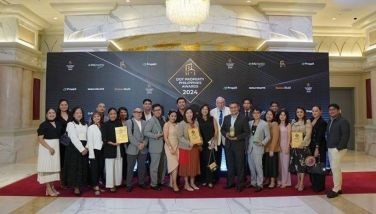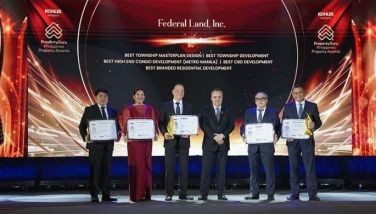PCA hits government criteria for foreign-assisted projects
July 9, 2001 | 12:00am
Local contractors are up in arms against the current government procurement practices of construction services on infrastructure works that are financed by multi-national financial institutions.
The Philippine Constructors Association, Inc. (PCA) claimed that the government is becoming more and more discriminatory by setting ultra-high prequalification standards, to the point of being unreasonable and realistic – a scheme to ensure that no Filipino contractor would qualify to participate in the bids.
What is even more appalling is the fact that government agencies continue such practice despite statistics of the past two years showing that the bids/tenders submitted by foreign firms are substantially higher than Approved Agency Estimates (AAE), especially when Filipino contractors are excluded from the arena of competition.
Citing the case of the C-5/Ortigas Avenue Interchange Project (Package II) of the Department of Public Works and Highways (DPWH) financed by the Japan Bank for International Cooperation (JBIC). Despite their continued good performance over the decades, the top four Filipino contractors namely: D.M. Consunji, Inc. (DMCI), EEI Corporation, J.H. Pajara Construction and F.F. Cruz & Co., were all disqualified because the standards set were so unreasonably high and no longer commensurate with actual requirements of the project.
F.F. Cruz & Co., the contractor which accomplished Package I of the same project ahead of schedule, was disqualified allegedly because it is technically incapable of executing the Package II despite the fact that its equipment yard is just right beside the project site, a built-in advantage which could result to lesser mobilization cost, among others.
The fact that only two, Sumitomo Construction and Hanjin Heavy Industries out of the nine prequalified foreign construction firms namely Hanjin Heavy Industries, Italian Thai Development Pub. Co/Makati Development Company; China Road & Bridge Corporation.
Kajima Corporation; Daiho Corp./Atlantic Erectors; China Harbour Engineering company; Sumitomo Construction; CMC/Monark Pacific and China Everbright, submitted their bids is highly suspicious.
The PCA also said that opening of the second envelope which contains the financial proposal was opened without even completing a thorough evaluation of the contents of the first envelope which contains the technical proposal which is highly anomalous and a clear violation of the Implementing Rules and Regulations of P.D. 1594.
Allowing the award of government projects to the foreign bidder whose bid is P925 million or 28 percent higher than AAE when Filipino contractors have the capability of doing the project at a cost of not more than P550 million or 24 percent lower than AAE, is an act grossly disadvantageous to the government punishable under Sec. 3 (e) R.A. 3019.
The PCA explained that a great number of government rules, regulations and prequalification standards for construction activities are set to provide an environment towards foreign preference as well as large players preference that blocked the chances of local players to compete and develop their competitive advantage.
Never before in the history of the Philippines has this situation been so blatant, the PCA said, adding, local designers, consultants and contractors are now utilized more as mere subcontractors to foreign players.
Recently, local manufacturers of construction materials are being marginalized as foreign designers, consultants and contractors have shifted preference to utilized foreign products, the PCA said.
The PCA urged President Arroyo to protect the Filipino people – the ultimate payor of the government projects.
They also call on the President to put a stop to such government practice which deprives the local construction industry a level playing field, a true opportunity for fair competition and real transparency.
The Philippine Constructors Association, Inc. (PCA) claimed that the government is becoming more and more discriminatory by setting ultra-high prequalification standards, to the point of being unreasonable and realistic – a scheme to ensure that no Filipino contractor would qualify to participate in the bids.
What is even more appalling is the fact that government agencies continue such practice despite statistics of the past two years showing that the bids/tenders submitted by foreign firms are substantially higher than Approved Agency Estimates (AAE), especially when Filipino contractors are excluded from the arena of competition.
Citing the case of the C-5/Ortigas Avenue Interchange Project (Package II) of the Department of Public Works and Highways (DPWH) financed by the Japan Bank for International Cooperation (JBIC). Despite their continued good performance over the decades, the top four Filipino contractors namely: D.M. Consunji, Inc. (DMCI), EEI Corporation, J.H. Pajara Construction and F.F. Cruz & Co., were all disqualified because the standards set were so unreasonably high and no longer commensurate with actual requirements of the project.
F.F. Cruz & Co., the contractor which accomplished Package I of the same project ahead of schedule, was disqualified allegedly because it is technically incapable of executing the Package II despite the fact that its equipment yard is just right beside the project site, a built-in advantage which could result to lesser mobilization cost, among others.
The fact that only two, Sumitomo Construction and Hanjin Heavy Industries out of the nine prequalified foreign construction firms namely Hanjin Heavy Industries, Italian Thai Development Pub. Co/Makati Development Company; China Road & Bridge Corporation.
Kajima Corporation; Daiho Corp./Atlantic Erectors; China Harbour Engineering company; Sumitomo Construction; CMC/Monark Pacific and China Everbright, submitted their bids is highly suspicious.
The PCA also said that opening of the second envelope which contains the financial proposal was opened without even completing a thorough evaluation of the contents of the first envelope which contains the technical proposal which is highly anomalous and a clear violation of the Implementing Rules and Regulations of P.D. 1594.
Allowing the award of government projects to the foreign bidder whose bid is P925 million or 28 percent higher than AAE when Filipino contractors have the capability of doing the project at a cost of not more than P550 million or 24 percent lower than AAE, is an act grossly disadvantageous to the government punishable under Sec. 3 (e) R.A. 3019.
The PCA explained that a great number of government rules, regulations and prequalification standards for construction activities are set to provide an environment towards foreign preference as well as large players preference that blocked the chances of local players to compete and develop their competitive advantage.
Never before in the history of the Philippines has this situation been so blatant, the PCA said, adding, local designers, consultants and contractors are now utilized more as mere subcontractors to foreign players.
Recently, local manufacturers of construction materials are being marginalized as foreign designers, consultants and contractors have shifted preference to utilized foreign products, the PCA said.
The PCA urged President Arroyo to protect the Filipino people – the ultimate payor of the government projects.
They also call on the President to put a stop to such government practice which deprives the local construction industry a level playing field, a true opportunity for fair competition and real transparency.
BrandSpace Articles
<
>
- Latest
Latest
Latest
October 11, 2024 - 3:45pm
October 11, 2024 - 3:45pm
October 10, 2024 - 11:30am
October 10, 2024 - 11:30am
October 5, 2024 - 12:08pm
October 5, 2024 - 12:08pm
September 24, 2024 - 1:00pm
September 24, 2024 - 1:00pm
September 13, 2024 - 4:00pm
September 13, 2024 - 4:00pm
September 9, 2024 - 9:45am
September 9, 2024 - 9:45am
Recommended






























